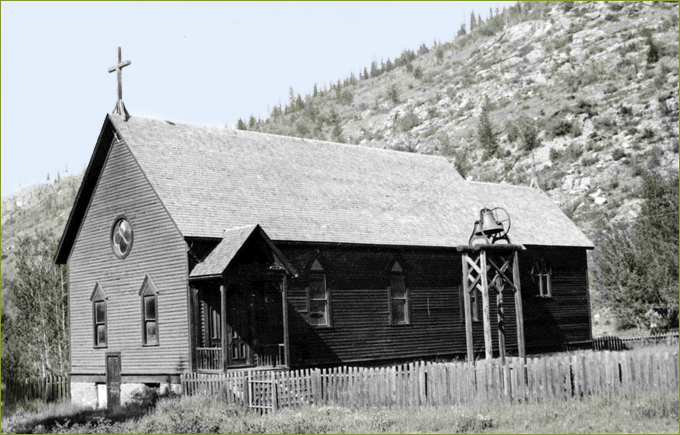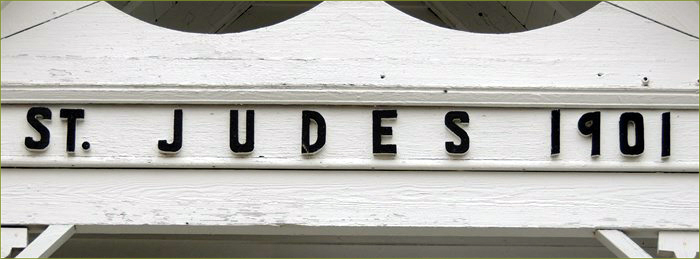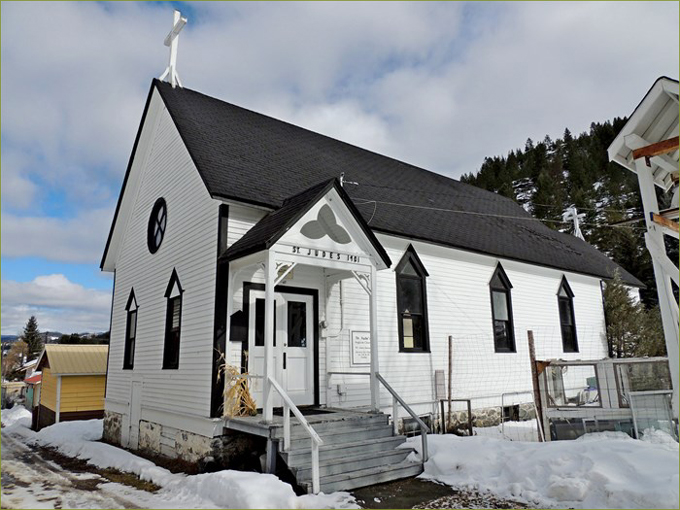

The Reverend of St. Jude's
BY: BG EDITOR

St. Jude's Church, Greenwood, Sep 14, 1936
B. C. Archive, #B-02975 (tinted)
BY: BG EDITOR
Sep 30, 2017 — GREENWOOD, BC (BG)
In September 1899, news arrived that the Church of England was sending a man to Greenwood. Although the Church was represented by clergy in Grand Forks who periodically held services here, it was the arrival of Reverend W. A. Robins that solidified the Church's presence in Greenwood.
The announcement of his commission appeared in the Boundary Creek Times:[1]
New Clergyman
"Rev. W. Robins, B. A., curate of St. Mary Redcliffe, Bristol, has been offered the charge of the Church of England mission in Greenwood. Mr. Robins is a nephew of Dr. Gott, bishop of Truro, and a son of a well known clergyman of Cheshire. He is about 30 years of age and unmarried. Bishop Gott says of him: "He is exceptionally devout, energetic and gifted in parish work of all kinds, a good preacher and is very successful in dealing with men." Mr. Robbins is expected to arrive shortly, but the exact date, is not known. Archdeacon Peatreath will visit Greenwood the end of this month to confer with the members of the Church of England on church matters."
"Rev. W. Robins, B. A., curate of St. Mary Redcliffe, Bristol, has been offered the charge of the Church of England mission in Greenwood. Mr. Robins is a nephew of Dr. Gott, bishop of Truro, and a son of a well known clergyman of Cheshire. He is about 30 years of age and unmarried. Bishop Gott says of him: "He is exceptionally devout, energetic and gifted in parish work of all kinds, a good preacher and is very successful in dealing with men." Mr. Robbins is expected to arrive shortly, but the exact date, is not known. Archdeacon Peatreath will visit Greenwood the end of this month to confer with the members of the Church of England on church matters."
By about a year later, the new Reverend was actively serving the local congregation, officially known as the St. Jude's Church of England Mission, Greenwood. In 1901 the new Church building was constructed, and in it, Rev. Robins officiated the marriage of Mr. E. H. Mortimer and Miss Rose Zioman. Over the next four years, local news reports of his appearance at various church and social events are many.

However, it was not long after he arrived that the Reverend went back to visit Bristol. In July 1902, the Times announced that he had left Greenwood for a three-month trip back to his old home in England. And in fact, this would be just the first of Rev. Robins' Greenwood/England round trips.
By the Spring of 1903 the Reverend was again active in Greenwood, and pursuing the Church's business. A Times report[2] mentioned that Easter service was held that year at the Masonic Hall. Given their own new Church facility, Easter at the Masons may have served as a means of expanded fund-raising, to cover the costs of church construction:
"The Church of England held its Easter program at the Masonic Hall. During his address, Rev. Robins noted that 1902 had closed with the church holding a large debt, which he hoped would improve in the current year."
Despite his success in having raised the new building and establishing for the Church of England a more formal presence in Greenwood, Reverend Robins' stay here would be fairly short. In October 1904, the Times announced his imminent departure:[3]

PARTING REFERENCE.
"In a neat little five minutes' speech at the Oddfellow gathering last evening Rev. Mr. Robins made reference to his intended early departure from Greenwood. He was candid enough to say that although he was going to scenes of greater historic interest, to places of great wealth and population, and ultimately to the old home land, he would not forget the little town in the mountains he was about to leave. He knew that like many who had written him from far separated places of the earth, he would often wish he were back in the glorious west, the land of breadth, the land of men.
In all things there were compensations, and this great, isolated wild west, denied the comforts and delights of older civilizations, has characteristics of candor and frankness and manliness wanting in them. He who makes an even trade of the spirit of the west for that of the east loses in the exchange."
"In a neat little five minutes' speech at the Oddfellow gathering last evening Rev. Mr. Robins made reference to his intended early departure from Greenwood. He was candid enough to say that although he was going to scenes of greater historic interest, to places of great wealth and population, and ultimately to the old home land, he would not forget the little town in the mountains he was about to leave. He knew that like many who had written him from far separated places of the earth, he would often wish he were back in the glorious west, the land of breadth, the land of men.
In all things there were compensations, and this great, isolated wild west, denied the comforts and delights of older civilizations, has characteristics of candor and frankness and manliness wanting in them. He who makes an even trade of the spirit of the west for that of the east loses in the exchange."
A few weeks later, on November 11th, the final goodbye was made:[4]
"Rev. W. A. Robins said farewell to his friends at St. Jude's Hall on Tuesday evening last and on Wednesday started on an extended tour of the far east, before settling down to his ministerial duties in a prominent English parish. He has been in Greenwood for five years during which time he has been instrumental in erecting a neat church building and in building up a flourishing church society. He was the recipient at the farewell meeting of an address by his parishioners and of a testimonial in the shape of a well-filled purse.
The services in St. Jude's were taken on Sunday last by the Rev. Archdeacon Beer in the morning and by the new rector, Rev Lawrence Amor, in the evening. The new incumbent comes from New Westminster."
The services in St. Jude's were taken on Sunday last by the Rev. Archdeacon Beer in the morning and by the new rector, Rev Lawrence Amor, in the evening. The new incumbent comes from New Westminster."
Having arrived back in England, Reverend Robins spoke to a group in Winchester, in 1907.[5] His remarks give us a fascinating view of just how this Church of England preacher experienced life in the rough-and-tumble mountainous mining town of Greenwood, British Columbia.
Although he vigorously described the austerities of living in early Greenwood, W. A. Robins obviously loved it enough to be drawn back here once again. In March of 1910, a Times report[6] tells us that Reverend Robins was back in Greenwood, and officiating at the funeral of Alice Palmer.
A GRAPHIC RECITAL
Drawn in Winchester, England
BY A FORMER GREENWOODITE
Drawn in Winchester, England
BY A FORMER GREENWOODITE
Speech at a Missionary Meeting in Winchester, England, on the "Call of Canada"
The Hampshire Observer of July 13th, thus reports a speech made there by Rev. W. A. Robins, formerly of Greenwood but now of Bristol, England. The Rev. W. A. Robins, M A., formerly of the diocese of Kootenay, British Columbia, gave an address which was a kind of word cinematograph of pictures of Colonial life in the recesses of the Rocky Mountains. In speaking about Canada, he said the country was so vast that in the short time at his disposal he could not tell them all he wished.
Probably not many present had any idea what western mining life was like. They must try to imagine to themselves a vast and dreary expanse of mountains, smothered in the everlasting pine, huge areas of which were devasted by incessant forest fires which made them indiscribablv dreary. They must try to picture themselves coming from a long journey right up into the hearts of the mountains, and finding in that desolate place a clearing where a large part was taken up by large stumps of trees, three feet from the ground and blackened by the fires, and there they would see a long, strangling street — so-called. It consisted of wooden houses — there was not a stone or a brick in the place — without a touch of paint to relieve the monotony, jumbled together in any way, more or less straight, the front all higgeldy-piggeldy, with telegraph and telephone poles on their fronts, a medley of modernity and antiquity.
There was a strange contrast, wildness, and fierce isolation all round, and in the center was this life, teeming with all kinds of interest. Everything was most up-to-date. The men were in possession of the latest news, there was a daily paper — or rag, as they used to call it — and by means of the telegraph they kept in touch with all the markets of the world. They lived most extraordinarily keen, active, and up-to-date lives, with the telegraph, the telephone, and the electric light. The movement of thought was more rapid than the movement of body, for the latter was rather slow. Transportation was one of the difficulties.
In the streets there were the men such interesting and fascinating creatures — when one got to know them, perfectly splendid instances of sheer virgin soil as regards human nature. It was human in the raw. One of the most fascinating things in the world. There one got it, and got it straight.
That was the sort of place he started in. He was sorry to say that as usual, the Church of England was last in the field there. He hired a dancing saloon at the rate of £ 6 per month, but he could only have it one day a week and that was on Sunday. He got a packing case to use as a desk and scrubbed it himself, and that served as an altar. Not many years ago — not ten — he held his first service there, and an enormous crowd of men wanted to hear what the strange preacher was like. These men were people who marked one down and wanted to sample one the moment one arrived. After the service was over he took down names, and called for volunteers for the choir, and then held practices. These men helped him through the hard times, and they were the nucleus of one of the soundest bodies of men he had ever met in his life.
Then began a work which meant in five years a church and a parish room with a neat fence round them, and in a clearing in a virgin forest — a difficult thing to do because it meant blasting — a cemetery was made and consecrated by the Bishop, a reverent place to lay the dead instead of burying them in an old box by the side of the road, and it was something reminiscent of home. That work spread over all the mountain, up to 7,000 feet above sea level, and that was the way it began. He now saw that his little church had applied for a grant for extension, and that it had just doubled in size. That was the way God worked in those far off climes. (applause) Was it not an odd thing that people were not keen about missions? They would not think it odd out there. But there were difficulties. Of course, they were very much isolated, in spite of the telegraph, and missions was one of the things that kept them in touch with the world.
The parish priest was very much isolated. He had to stand on his own: he could not consult the Bishop, nor could he apply for a faculty when he wanted to do anything; he had to do it in five minutes or it was not done at all. He could not apply for help to the nearest parish priest, because he was too far away. Parish boundaries out there were rather extensive. He had none at all on the north side, while to the south the boundary was the American boundary. There was no background of history, no tradition, no prestige, or anything of that sort, and therefore there was nothing to appeal to the men through. There was very little distinction between right or wrong, and there was no tone. They could not appeal to a man out there on a question because the word was not known as he and that meeting knew it. Over and above all they had this magnificent character to deal with — men in the raw, on whom one could not pass off an old sermon because they would not have it. That was what made it worthwhile talking to them.
The Colony was nothing but a crowd of men when he went there, but he was glad to say that women were now coming in and ameliorating the conditions. These men were hard thinkers: education was very much more advanced than it was at home; Winchester boys were out there working in the mines as well as others. They wanted something pretty sound, keen, and good in sermons, or they would not come to the church at all. The worst men to deal with were those called "remittance men". These were public school boys who had gone to Canada — to Manitoba and have made, a mess of things and lost all they had, and then had come up into the Rocky Mountains. There they were face to face for the first time with the hardest condition of things. They had got so low that they could not look down any more: they must look up. Religion to them while here in England meant something which was practically conventional. They never worried about it, and never realized a personal Lord at all. By dogged perseverence and love they were got to realize this, and generally was a good thing toward accomplishing this end.
A MERE TOUCH OF ENGLISH LIFE
He used to give lectures on the South African war when that was on, and that was a matter in which they were most interested, because thirty of the men joined Strathcona's Horse*. This all helped his work. It was magnificent material which these men afforded to deal with, but it required enormous patience on the part of the worker. Mere touches of home life won these men, and for the first time in their lives they heard the call of a personal Savior, and they came nearer to the alter, and the missionary felt it was worth while going out there to get it.
The circumstances of life out there were very unconventional, and friendships were made and maintained in the most accidental fashion. He related how one man who steadfastly refused to come to his Sunday service, cheerfully undertook the duty of sweeping out the church on Saturday. These men loved the Church of England, and out of their love to the old church they were most kind to her representative. But they were critical, and if they thought so they did not hesitate to tell him that he preached a rotten sermon on the previous Sunday.
The home life was another chapter, and the homes of the Canadian's were royal homes. In them he learnt for the first time what hospitality meant. There was none of the English pride there, but there was deal of the British pride, which was rather a different thing. English pride was a silly thing. British pride meant love of country and love of God, which made patriotism and love of church.
The self-denial in these Canadian homes was amazing. There were only forty of them, but they gave their pastor £ 240 a year, and they never gave less than £ 30 or £ 40 a year to foreign missions. (Applause) The church there stood on her merits. It was not established: it was just one of the sects, and a very good thing for her too. The minister was called a preacher, and he had lo stand and do the best he could on these grounds. But they saw wonderful results in the formation and making of character. The great cry was for help of the best kind. These people out there were making history far faster than we in this country.
FOOTNOTES:
[1] Boundary Creek Times — Sep 16, 1899, p. 2
https://open.library.ubc.ca/collections/bcnewspapers/xboundarycr/items/1.0170678
[2] Boundary Creek Times — Apr 24, 1903, p. 6
https://open.library.ubc.ca/collections/bcnewspapers/xboundarycr/items/1.0171040h
[3] Boundary Creek Times — Oct 28, 1904, p. 6
https://open.library.ubc.ca/collections/bcnewspapers/xboundarycr/items/1.0170853
[4] Boundary Creek Times — Nov 11, 1904, p. 5
https://open.library.ubc.ca/collections/bcnewspapers/xboundarycr/items/1.0170861
[5] Boundary Creek Times — Aug 23, 1907, p. 1 — "A Graphic Recital"
https://open.library.ubc.ca/collections/bcnewspapers/xboundarycr/items/1.0172599
[6] Boundary Creek Times — Mar 18, 1910, p. 1
https://open.library.ubc.ca/collections/bcnewspapers/xboundarycr/items/1.0172368
REFERENCES:
* Greenwood Members of Strathcona's Horse ('Greenwood War Heroes', Jul-Aug 2017)
http://beautifulgreenwood.com/features/features.html


